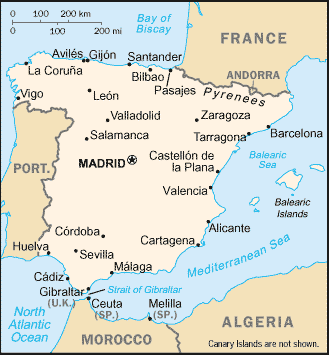World >
Europe >
Spain
Introduction:
|
Spain's powerful world empire of the 16th and 17th centuries ultimately yielded command of the seas to England. Subsequent failure to embrace the mercantile and industrial revolutions caused the country to fall behind Britain, France, and Germany in economic and political power. Spain remained neutral in World Wars I and II, but suffered through a devastating civil war (1936-39). In the second half of the 20th century, Spain has played a catch-up role in the western international community; it joined the EU in 1986. Continuing concerns are Basque Fatherland and Liberty (ETA) terrorism and further reductions in unemployment.
|
|
Official name: |
Kingdom of Spain
|
|
Capital: |
Madrid |
|
Government type: |
parliamentary monarchy |
|
Population: |
40,217,413 (July 2003 est.) |
|
Languages: |
Castilian Spanish 74%, Catalan 17%, Galician 7%, Basque 2%
note: Castilian is the official language nationwide; the other languages are official regionally |
|
Official Currency: |
euro (EUR)
note: on 1 January 1999, the European Monetary Union introduced the euro as a common currency to be used by the financial institutions of member countries; on 1 January 2002, the euro became the sole currency for everyday transactions with the member countries |
|
Currency code: |
EUR |
|
Area: |
total: 504,782 sq km
water: 5,240 sq km
note: there are 19 autonomous communities including Balearic Islands and Canary Islands, and three small Spanish possessions off the coast of Morocco - Islas Chafarinas, Penon de Alhucemas, and Penon de Velez de la Gomera
land: 499,542 sq km |
|
Climate: |
temperate; clear, hot summers in interior, more moderate and cloudy along coast; cloudy, cold winters in interior, partly cloudy and cool along coast |
|
Map of Spain
|
